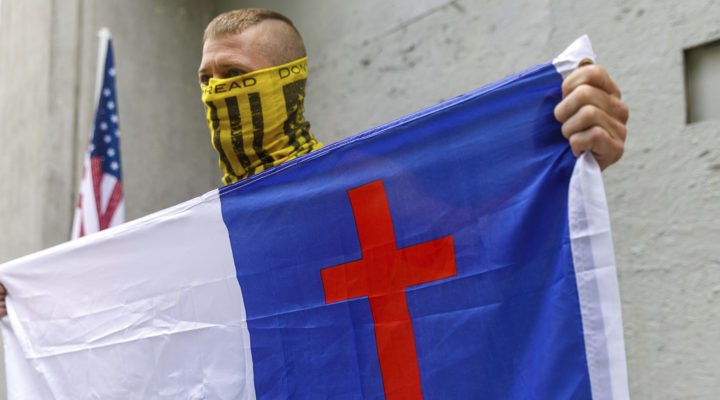I’m pleased to share with you insights from the largest survey of Christian nationalism ever conducted, which was released today by PRRI. The survey was fielded among a sample of more than 22,000 Americans throughout 2023. This large sample size gives us the ability, for the first time, to see levels of support for Christian nationalism in all 50 states.
I’m also including the video of the survey launch webinar, which included commentary from three experts in the field (if you don’t have their books, I highly recommend them):
- Katherine Stewart, journalist and author of The Power Worshippers: Inside the Dangerous Rise of Religious Nationalism
- Jemar Tisby, professor of history at Simmons College of Kentucky and author of the New York Times bestselling book, The Color of Compromise: The Truth about the American Church’s Complicity in Racism
- Andrew Whitehead, associate professor of sociology at IUPUI and author of American Idolatry: How Christian Nationalism Betrays the Gospel and Threatens the Church
Here’s my take on the most compelling insights from this groundbreaking survey. You can read the entire report on PRRI’s website. You can also read Andrew Whitehead’s take on his Substack newsletter.
Building on the scholarship of Andrew Whitehead, Sam Perry, Phil Gorski, Paul Djupe and others, and on the PRRI/Brookings Christian Nationalism Survey conducted one year ago, PRRI developed five distinct agree/disagree questions to measure support for Christian nationalism:
- God has called Christians to exercise dominion over all areas of American society.
- The U.S. government should declare America a Christian nation.
- Being Christian is important part of being truly American.
- If the U.S. moves away from our Christian foundations, we will not have a country anymore.
- S. laws should be based on Christian values.
The new survey finds that three in ten Americans can be classified as Christian nationalism Adherents or Sympathizers (those who either fully or mostly agree with these five statements), while two thirds of Americans can be classified as Christian nationalism Skeptics or Rejecters (those who either mostly or fully disagree with these five sentiments). Levels of support for Christian nationalism have not significantly changed over the last year.
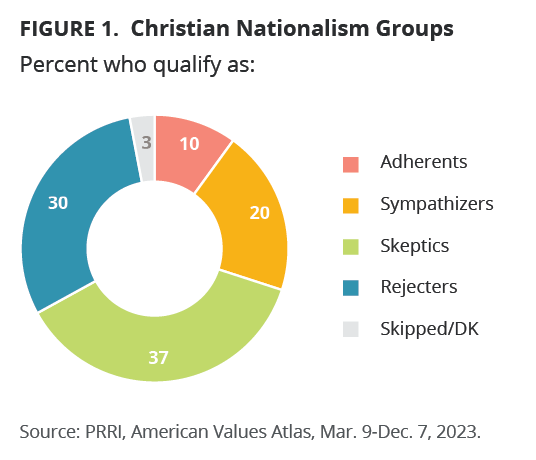
So most Americans, by a margin of two to one, oppose this anti-democratic worldview. But these sentiments have come to have outsize power because they have become a defining feature of Donald Trump’s MAGA movement and his takeover of the Republican Party.
A majority (55%) of Republicans and those who hold favorable view of Trump qualify as Christian nationalism Adherents or Sympathizers.
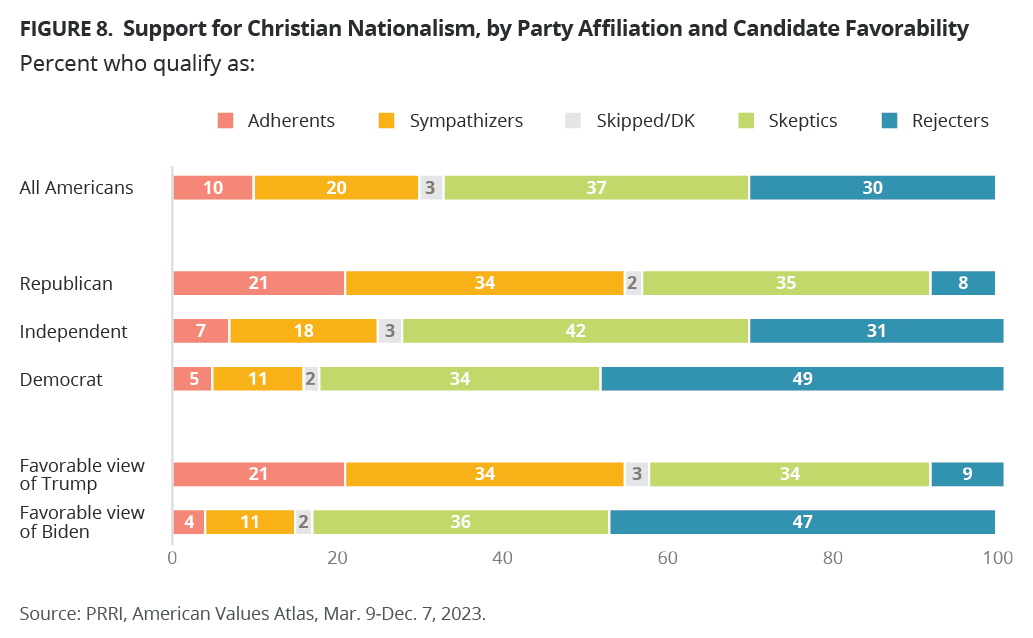
Residents of red states are nearly twice as likely as residents of blue states to be Christian nationalism Adherents or Sympathizers.
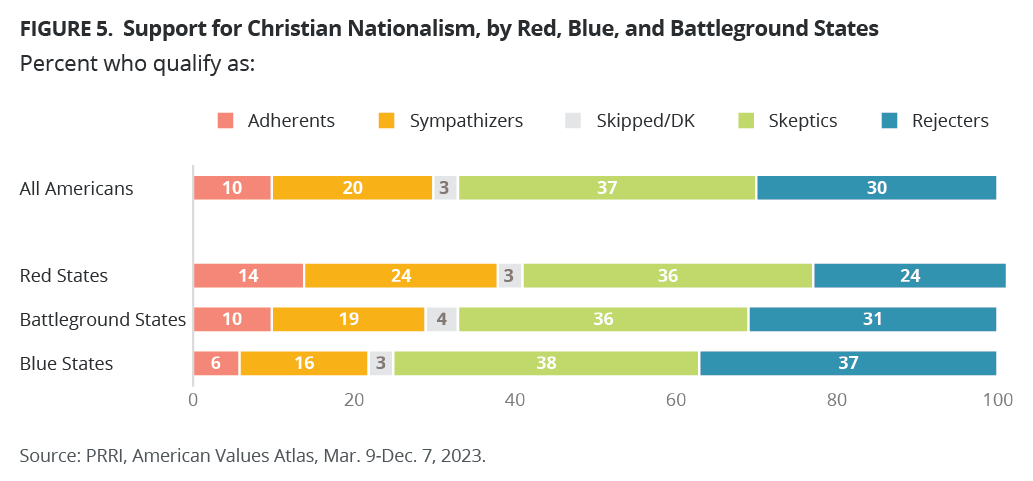
The proportion of Americans who qualify as Christian nationalism Adherents or Sympathizers differs considerably across states, ranging from lows of 17% in Oregon and 18% in Massachusetts to highs of 50% in both North Dakota and Mississippi.

At the individual state level, support for Christian nationalism is highly correlated with support for Trump. Notably, if we restrict the analysis to white Americans, that correlation is nearly textbook perfect.
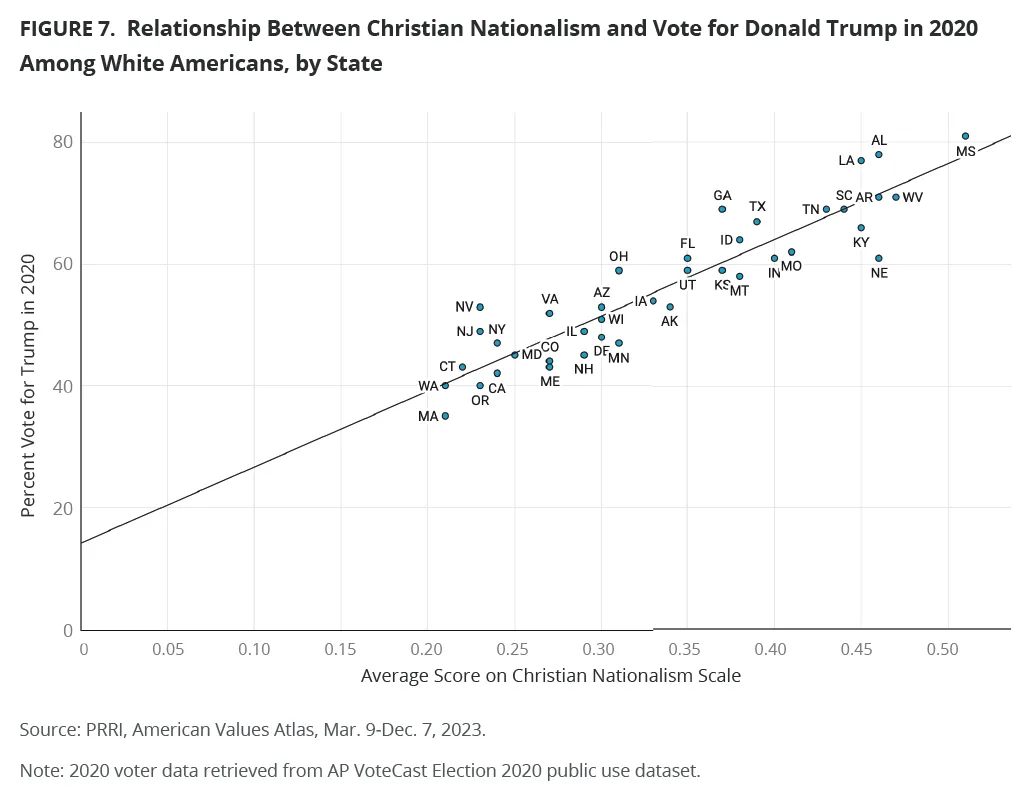
There are only two major religious groups in which a majority qualify as Christian nationalism Adherents or Sympathizers: white evangelical Protestants (66%) and Hispanic Protestants (55%), a group among whom seven in 10 also identify as evangelical or born-again.
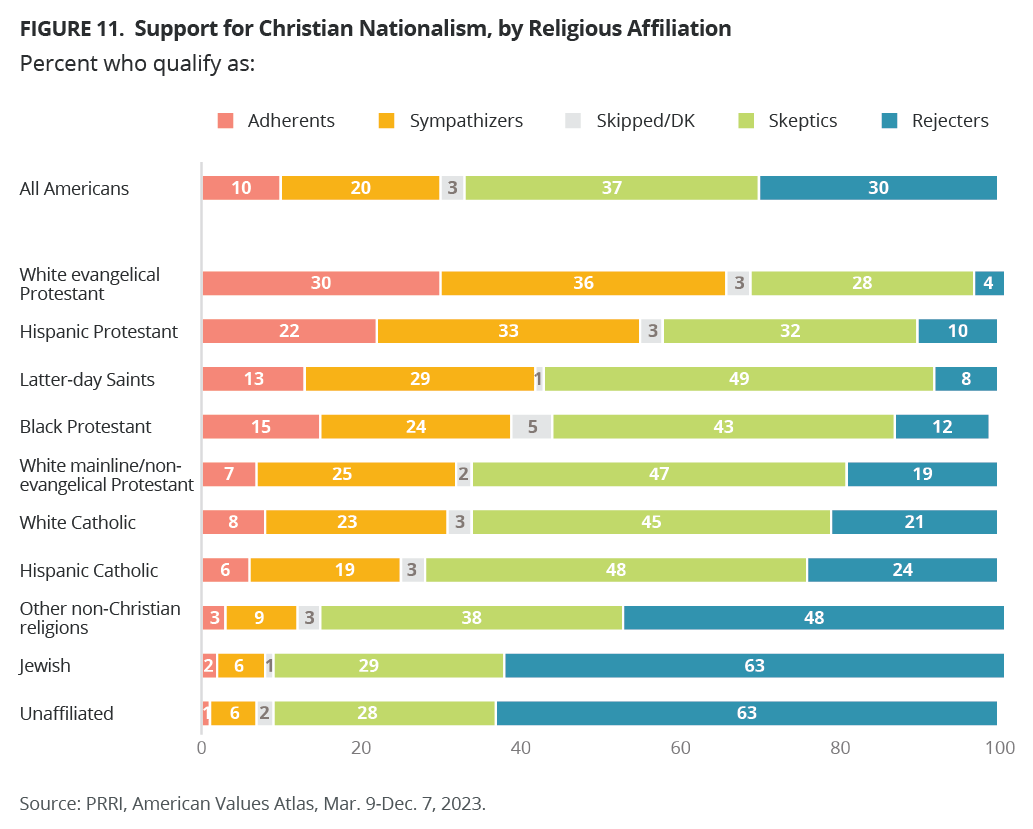
Contrary to some assertions that Christian nationalists are CINOs (Christian in name only), Christian nationalism is highly correlated with frequent church attendance. Among Americans who attend religious services weekly or more, a majority (52%) are Christian nationalism Adherents or Sympathizers, compared with 38% of those who attend a few times a year and only 18% of those who seldom or never attend.
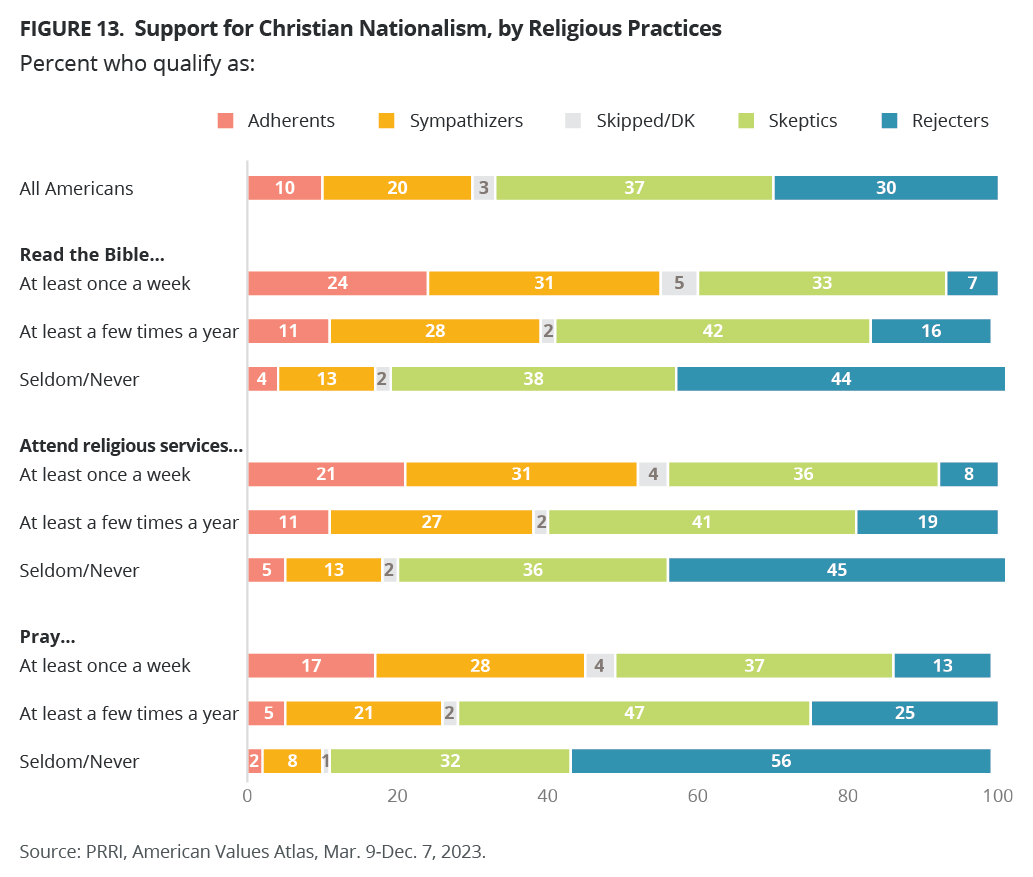
Why should we be worried about this?
There is of course the obvious: The idea of America as a promised land for European Christians — a powerful idea that predates the founding of the country — is fundamentally anti-democratic because it establishes a de facto ethno-religious state. Beyond that, it raises the stakes of political contests exponentially, transposing political opponents into existential enemies.
Politics is no longer understood to be disagreements between fellow citizens of good will but apocalyptic battles over good and evil, fought by agents of God against agents of Satan. Political opponents should not just be defeated in fair electoral contests but should be jailed, exiled, attacked or even killed.
Indeed, this erosion of democratic and civic norms is just what we find in this survey. Christian nationalists are more likely than other Americans to think about politics in apocalyptic terms and are about twice as likely as other Americans to believe political violence may be justified. Nearly four in 10 Christian nationalism Adherents (38%) and one-third of Sympathizers (33%) agree that “Because things have gotten so far off track, true American patriots may have to resort to violence to save the country,” compared with only 17% of Skeptics and 7% of Rejecters.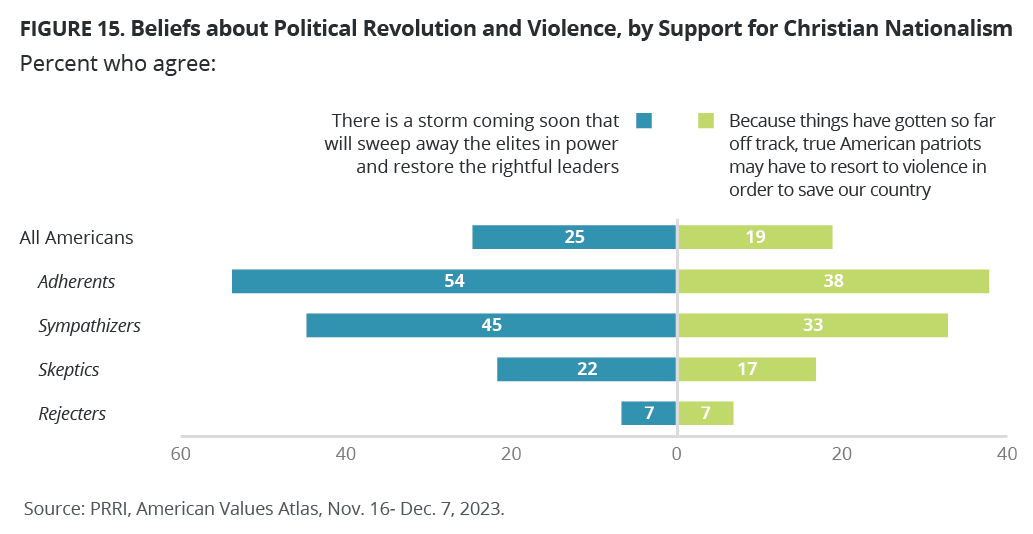
In my recent book, The Hidden Roots of White Supremacy and the Path to a Shared American Future, I made the case that Christian nationalism is best understood as a term describing the new incarnation of an old claim: that America is a God-ordained promised land for European Christians, where they alone occupy the highest positions of power and where laws are judged to be valid based on their particular interpretation of the Bible.
We’ve never fully resolved the contradictions between the regressive fantasy of America as a white Christian nation and the aspirational vision of America as a pluralistic democracy.
This survey illustrates how strongly white Christian nationalism is driving support for Donald Trump and the MAGA movement and how thoroughly it has established itself as an ideological keystone in today’s Republican Party. Until we fully vanquish this dangerous, authoritarian political theology, it will continue to undermine the potential for a truly democratic American future.
Robert P. Jones serves as president and founder of PRRI and is the author of The Hidden Roots of White Supremacy and the Path to a Shared American Future and White Too Long: The Legacy of White Supremacy in American Christianity, which won a 2021 American Book Award.
This column originally appeared on Robert P. Jones’s substack #WhiteTooLong.

